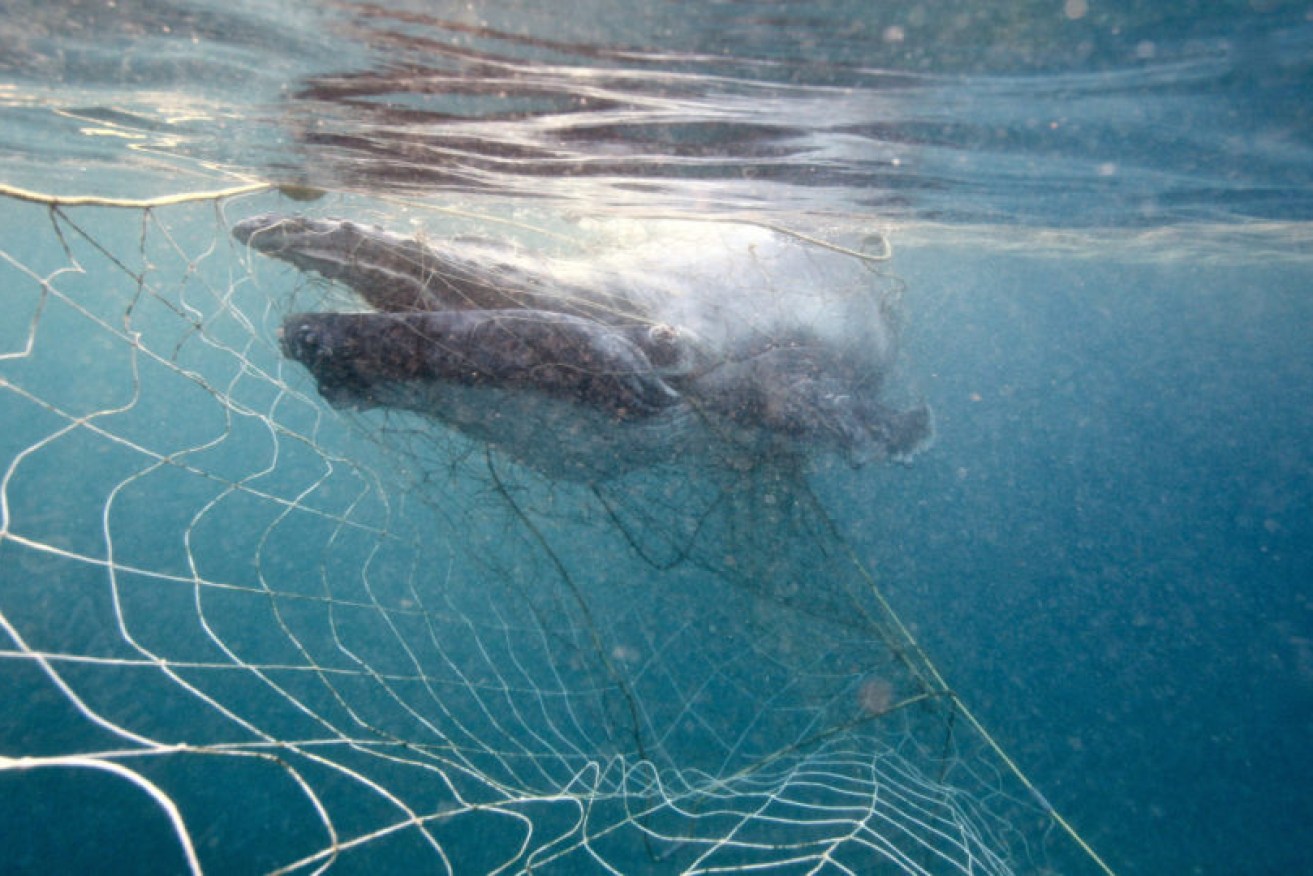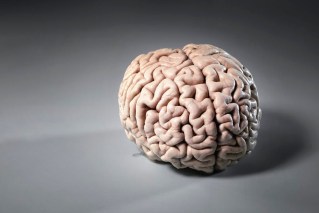Jumping the shark: Tangled whale restarts debate over Coast’s controversial nets
Rescuers today entered their second day of trying to free a juvenile humpback whale entangled in shark nets off the Gold Coast, as controversial campaigns to ditch the nets for more sophisticated shark deterrents regained pace.


Marine experts have once again questioned the role of shark nets, particularly during whale migration season (Image: AAP)
The calls to replace the shark nets with drones or SMART drumlines during whale migration season come despite the raw memories of Queensland’s first shark attack death in more than 60 years off the Gold Coast less than 12 months ago.
Surfer Nick Slater was killed when a great white shark attacked him while he was surfing in a netted zone on the southern Gold Coast in September last year.
Bound in netting, ropes and buoys, the distressed eight-metre whale this morning was 30 nautical miles, or around 55 kilometres, off the coast with rescue crews working to remove the remaining netting that has trapped the animal.
Griffith University’s Dr Olaf Meynecke said the exhausted whale was also towing anchors in the nets.
“There’s two anchors on that net, so it actually weighs the animal down,” Meynecke said.
Head of Marine Sciences at Sea World, Wayne Phillips, said teams aboard two Sea World rescue craft, along with the shark control program contractor and local research and rescue teams, were working to free the whale after trying for 10 hours on Wednesday.
“It was quite an emotional day. Trying to help an animal that large is very difficult and quite emotional for the team,” Phillips said.
“The whale was looking quite lethargic by the end of the day, and we are quite surprised by how far he has travelled overnight.
“That’s a good sign from a whale perspective. It may make our job harder – the more energy the animal has, the more difficult it is to work with them – but all in all, I think a pretty good sign for the whale.”
Satellite tracking has been attached to the whale that was spotted off Snapper Rocks, south of Coolangatta on the Gold Coast early yesterday.
The animal was first reported trapped in nets around 6am Wednesday when surfers and beachgoers at Snapper Rocks could hear the whale in distress.
The whale then travelled to waters off Fingal in northern NSW and then further out to sea off the Gold Coast overnight.
There are no shark nets off Snapper Rocks, only drum lines, and the whale is thought to have become entangled in the nets at Coolangatta, dragging them south.
The issue of sharks nets is highly contentious on the Gold Coast and along the Queensland coastline, pitting concern for the number of marine creatures trapped and killed in nets, including migrating whales, against public safety concerns.
Petitions and calls for shark nets to be dumped for their deadly impact on marine life sprung up again Wednesday within hours of the whale being reported trapped in nets around 6am.
A Change.org petition to Fisheries Minister Mark Furner to “stop whale entanglements” on the Coast has been signed by around 135,000 people.
Another to federal Environment Minister Sussan Ley, calling to “end 83 years of shark culling, remove nets and drumlines’ has attracted more than 70,000 signatures.
Last year, a delegation of whale researchers delivered a petition with 105,000 signatures to Furner calling for shark nets “designed to kill” to be lifted for a few weeks over winter whale migration season.
Last season four whales were trapped in shark nets off the Gold Coast, including three in three days.
The petition called for the nets to be replaced with “modern and better technology” to ensure swimmer safety.
Meynecke, who heads Griffith University’s Coastal and Marine Research Centre, said scientific evidence showed whale mothers and calves rested in Gold Coast waters, putting them at increased risk of being tangled in shark nets.
“We’ve got all this scientific evidence that there are a few nets that are particularly bad for whales because they keep catching them because this is where mothers and calves are resting,” he said.
“Local people know the nets aren’t a safe barrier and they don’t reduce the risk of shark interaction.”
He said the researchers wanted four of the 11 shark nets on the Gold Coast to be lifted and replaced with technology including SMART drumlines and drones.
SMART stands for Shark Management Alert in Real Time, and the drumlines contain a satellite-linked GPS communications unit attached to a baited hook.
When a shark takes the bait, scientists are alerted there is an animal on the line.
Fisheries and Queensland Surf Life Saving have been trialling technologies, including drumlines and drones, to see what alternatives to shark nets could be used off Gold Coast beaches to control sharks. It was expected last year that the shark nets may be replaced by more modern programs.
However, at that time, Queensland’s Shark Control Program had recorded only one fatality at a Shark Control Program beach since 1962.
Then in September, Slater was fatally attacked by a great white shark at Coolangatta.
It was the first fatal shark attack on a Gold Coast beach in 62 years.
The last deadly Gold Coast shark attack before the tragedy was the fatal mauling of 21-year-old Brisbane man Peter Gerard Spronk while swimming at Surfers Paradise in 1958.
Slater, who was longboard surfing in front of the surf club in a line-up of surfers and ski paddlers around 5pm, died within minutes of the shock attack by the shark.
The attack on Slater came after Gold Coast surfer Rob Pedretti was also killed by a shark attack in June last year when a three-metre great white bit him on the thigh as he was surfing with a friend off South Kingscliff Beach in northern NSW.
Pedretti, from Tugun, died from “catastrophic injuries” from the attack.
There have been 334 sharks captured in Queensland waters under the state’s shark control program this year.
In the weeks since the start of June, 35 sharks have been caught by the shark control program off Queensland beaches including two great whites and 19 tiger sharks.












